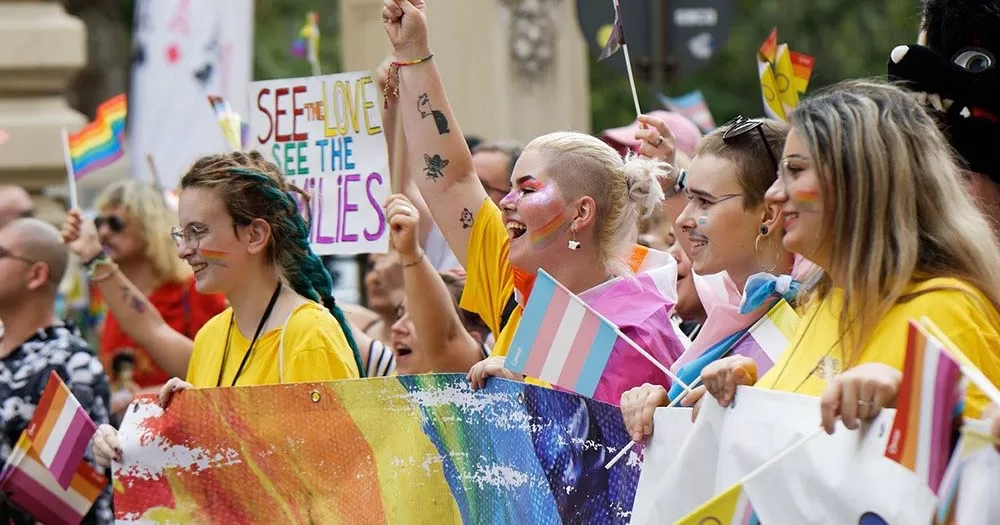October 11 is National Coming Out Day, a day created to celebrate queerness, promote greater LGBTQ+ awareness and visibility, and recognise the courage of individuals who choose to openly share their queer identities.
Coming Out Day was established in 1988 by psychologist and gay rights activist Robert Eichberg and founder of Lesbian Feminist Liberation Jean O’Leary. The date marks the anniversary of the 1987 National March on Washington for Lesbian and Gay Rights, when half a million people marched for queer rights in Washington, DC.
We’ve officially been celebrating Coming Out Day for 35 years, but the concept of coming out far precedes this date. In the early 1900s, the term ‘coming out’ most commonly referenced young women being formally introduced to society in a debutante ball. Early uses of the phrase among gay communities referenced Black gay men “coming out” at drag balls.
According to Time Magazine, a spring 1931 Baltimore Afro-American article cited, “The coming out of new debutantes into homosexual society was an outstanding feature of Baltimore’s eighth annual frolic of the pansies.”
View this post on Instagram
Today, people often come out first to their close friends or family, then to their professional communities, and again to new acquaintances throughout their lives. For some, coming out is as easy as casually mentioning their partner in conversation. For others, coming out is still an uncomfortable and even dangerous experience that means facing discrimination, hate, and judgement.
National Coming Out Day allows us to acknowledge these challenges and remember that every coming out story is unique. While coming out can be difficult, it can be incredibly liberating, and sharing our coming out stories within the LGBTQ+ community allows us to support and comfort each other.
For anyone questioning their identity, seeing others come out can offer hope and solidarity. Coming out also invites straight and cisgender people to recognise that everyone knows someone who is queer.
Robert Eichberg, co-founder of Coming Out Day, died in 1995 due to complications from AIDS. In a 1993 interview, he said: “Most people think they don’t know anyone gay or lesbian, and in fact everybody does. It is imperative that we come out and let people know who we are and disabuse them of their fears and stereotypes.”
Today is #NationalComingOutDay ?
Coming out is a complicated process that is different for everyone, but it is an important step in living your truth and achieving your queer hope and joy.
You can read coming out stories here on our website – https://t.co/FxN8HsEeHO pic.twitter.com/AE4yimM2ao
— LGBT Foundation (@LGBTfdn) October 11, 2023
While coming out is a significant moment for many LGBTQ+ people, no one should come out until they feel safe and ready to do so.
The need to come out only exists because straight and cis identities are still considered the default. Coming out is not a confession; it’s an opportunity to embrace our identities and fully show up as our whole selves. Some argue that it’s time to dismantle the idea of the closet and stop making assumptions about anyone’s sexuality or gender identity.
British Poet Dean Atta said it best: “Don’t come out unless you want to. Don’t come out for anyone else’s sake. Don’t come out because you think society expects you to. Come out for yourself. Come out to yourself. Shout, sing it. Softly stutter.”
© 2023 GCN (Gay Community News). All rights reserved.
Support GCN
GCN is a free, vital resource for Ireland’s LGBTQ+ community since 1988.
GCN is a trading name of National LGBT Federation CLG, a registered charity - Charity Number: 20034580.
GCN relies on the generous support of the community and allies to sustain the crucial work that we do. Producing GCN is costly, and, in an industry which has been hugely impacted by rising costs, we need your support to help sustain and grow this vital resource.
Supporting GCN for as little as €1.99 per month will help us continue our work as Ireland’s free, independent LGBTQ+ media.

comments. Please sign in to comment.